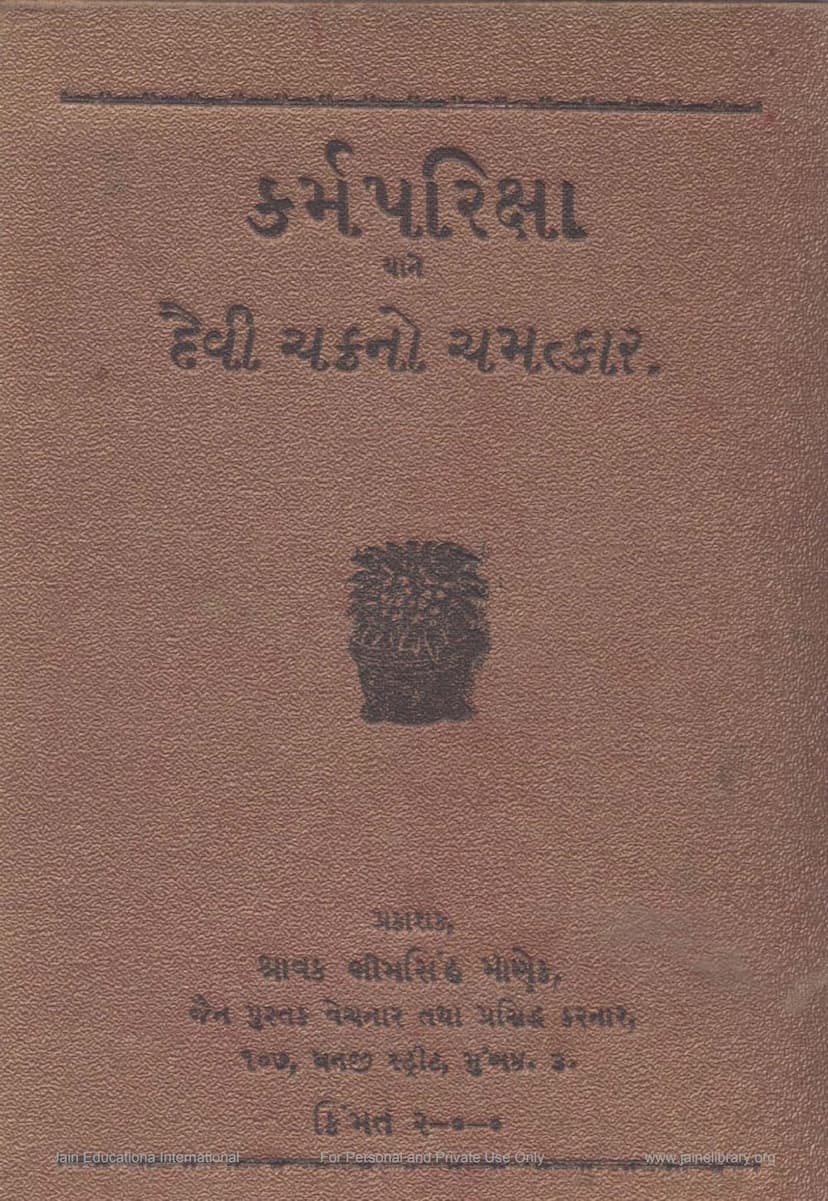Karm Pariksha Yane Daivi Chakrano Chamatkar
Added to library: September 2, 2025

Summary
Here is a comprehensive summary of the Jain text "Karm Pariksha yane Daivi Chakrano Chamatkar" by Shravak Bhimsinh Manek, based on the provided pages:
Book Title: Karm Pariksha yane Daivi Chakrano Chamatkar (Karm Test, or the Miracle of the Divine Wheel) Author: Shravak Bhimsinh Manek Publisher: Shravak Bhimsinh Manek
Overview:
This book, subtitled "A Illustrative Novel Showing the Rise and Fall of Good and Bad Deeds Arising from Merit and Demerit," is a narrative intended to illustrate the principles of Jain karma. It emphasizes the concept of "as you sow, so shall you reap" and aims to guide readers toward righteous conduct by showcasing the consequences of both virtuous and sinful actions. The book is based on an earlier work, "Shri Papbuddhi Raja ane Dharmbuddhi Mantri na Ras" (The Ballad of King Papbuddhi and Minister Dharmbuddhi), composed in verse by Pandit Udayaratnaji in Vikram Samvat 1867 (approximately 1810 AD). Shravak Bhimsinh Manek has adapted and expanded this earlier work into a modern, accessible novel.
Core Themes:
- Karma: The central theme is the law of karma, illustrating how one's actions in this life and past lives (purva bhav) directly influence one's present and future experiences. Good deeds lead to happiness and prosperity, while bad deeds lead to suffering and downfall.
- Righteousness vs. Sin: The narrative contrasts virtuous characters and their positive outcomes with sinful characters and their negative consequences. It highlights the importance of truth, compassion, charity, wisdom, and adherence to Jain principles.
- The Divine Wheel (Daivi Chakra): The title suggests that the unfolding of karma is like a divine wheel, constantly in motion, bringing about the fruits of actions in due course.
- Moral Lessons: The book serves as a moral guide, offering lessons on various aspects of life, including the dangers of addiction, deceit, cruelty, and the virtues of honesty, wisdom, and generosity.
- The Role of Companionship (Sansarga): The text emphasizes that the company one keeps significantly influences one's character and destiny, drawing parallels from nature.
Key Characters and Plot Elements (Based on Chapters 1-3 and general themes):
- King Jitarish: The king of Shripur, initially strong but corrupted by sinful thoughts and influenced by his wicked ministers. He embodies a ruler who neglects his duties and indulges in vices like drinking, hunting, gambling, and infidelity.
- Minister Mahisagar (later Dharmabuddhi): A wise, righteous, and virtuous minister who constantly tries to guide King Jitarish towards Dharma and righteousness. He represents wisdom and moral integrity.
- Prachandsinh and Dushtasinh: Cruel and self-serving ministers who lead the king astray and exploit the people. They are instrumental in the king's downfall and orchestrate schemes against the virtuous minister.
- The Narrative Arc: The story likely follows the king's descent into vice under the influence of his ministers, the minister's attempts to reform him, and the subsequent consequences that unfold due to their actions, demonstrating the karmic repercussions.
- Chapter 3 (Kamghat ni Prapti - Obtaining the Wish-Fulfilling Pot): This chapter indicates a significant plot point where a character (likely the minister or a virtuous figure) obtains a magical object that fulfills desires, possibly as a reward for their piety or as a tool to demonstrate the power of virtue.
Adaptation and Style:
The book is presented as a novel with a simple and clear language, making the complex philosophical concepts of karma accessible to a modern audience. While retaining the core message and structure of the original work, it adds relatable incidents and dialogues to enhance reader engagement. The author expresses hope that the readers will find the narrative enjoyable and insightful.
Historical Context:
The book acknowledges the rich tradition of Jain literature and the efforts of scholars to make ancient texts understandable. The mention of contemporaries like Anandghanji, Mohanvijayji, Yashovijayji, and Vinayvijayji places Udayaratnaji and his work within a significant period of Jain intellectual and literary activity.
Overall Purpose:
"Karm Pariksha yane Daivi Chakrano Chamatkar" is a didactic work designed to educate and inspire readers to lead a virtuous life by understanding and respecting the immutable law of karma. It aims to be both informative and engaging, demonstrating through a compelling narrative how actions shape destiny.